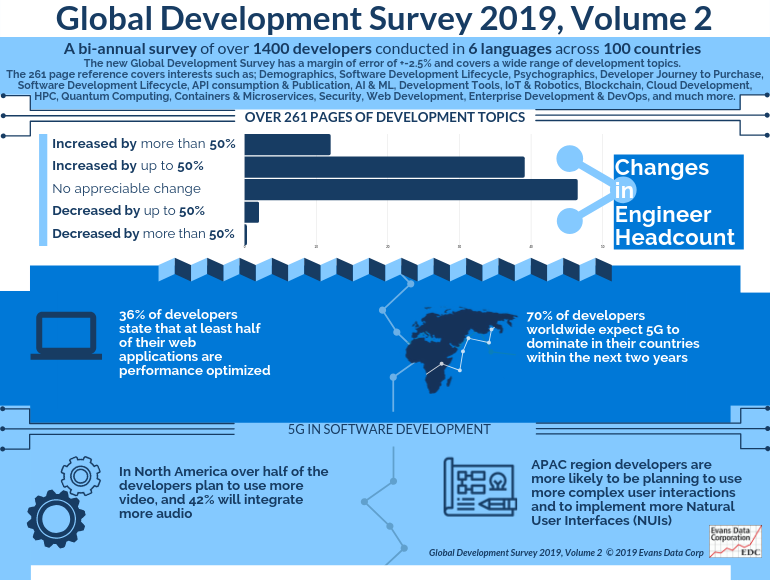JFrog announced a new machine learning (ML) lifecycle integration between JFrog Artifactory and MLflow, an open source software platform originally developed by Databricks.
70% of developers worldwide expect 5G to dominate in their countries within the next 2 years, according to Evans Data’s Global Development Survey.
The survey, conducted in 6 languages across 120 countries, showed a large appetite for 5G, but with significant differences between regions. For example, in North America, where adoption uptake is expected to be the fastest, 80% of developers believe 5G will dominate in 2 years time while 56% estimate it won’t take more than one year, and 28% think it will be dominant in 6 months. Compare this with the EMEA region where only 7% think 5G will dominate in 6 months, and 32% predict 5G dominance within the coming year.
Developers worldwide agree that Internet of Things (IoT) is the area that will most benefit from the capabilities and performance that 5G will bring, although there is a lot of anticipation surrounding Big Data gathering and processing, especially in the APAC region, where over a quarter of the developers feel that will be the biggest capability enhancement.
How will 5G affect software development? In North America over half of the developers plan to use more video, and 42% will integrate more audio. However, in the APAC region developers are more likely to be planning to use more complex user interactions and to implement more Natural User Interfaces (NUIs).
“The benefits of 5G aren’t simply faster connection speeds,” said Janel Garvin, CEO of Evans Data. “5G will bring capabilities for smarter and safer cities, continual interconnectivity, and new ways of interacting with technology.”

Industry News
Copado announced the general availability of Test Copilot, the AI-powered test creation assistant.
SmartBear has added no-code test automation powered by GenAI to its Zephyr Scale, the solution that delivers scalable, performant test management inside Jira.
Opsera announced that two new patents have been issued for its Unified DevOps Platform, now totaling nine patents issued for the cloud-native DevOps Platform.
mabl announced the addition of mobile application testing to its platform.
Spectro Cloud announced the achievement of a new Amazon Web Services (AWS) Competency designation.
GitLab announced the general availability of GitLab Duo Chat.
SmartBear announced a new version of its API design and documentation tool, SwaggerHub, integrating Stoplight’s API open source tools.
Red Hat announced updates to Red Hat Trusted Software Supply Chain.
Tricentis announced the latest update to the company’s AI offerings with the launch of Tricentis Copilot, a suite of solutions leveraging generative AI to enhance productivity throughout the entire testing lifecycle.
CIQ launched fully supported, upstream stable kernels for Rocky Linux via the CIQ Enterprise Linux Platform, providing enhanced performance, hardware compatibility and security.
Redgate launched an enterprise version of its database monitoring tool, providing a range of new features to address the challenges of scale and complexity faced by larger organizations.
Snyk announced the expansion of its current partnership with Google Cloud to advance secure code generated by Google Cloud’s generative-AI-powered collaborator service, Gemini Code Assist.
Kong announced the commercial availability of Kong Konnect Dedicated Cloud Gateways on Amazon Web Services (AWS).
Pegasystems announced the general availability of Pega Infinity ’24.1™.




